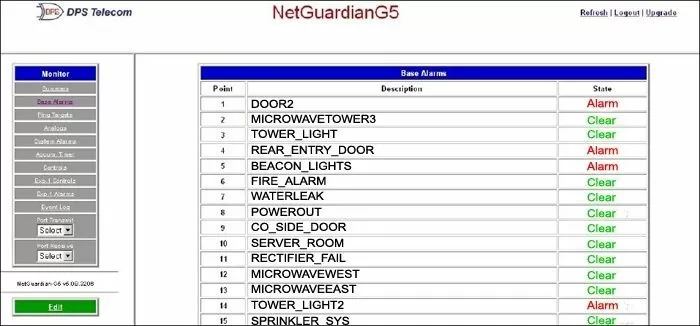Download our free SCADA tutorial.
An introduction to SCADA from your own perspective.
1-800-693-0351
Have a specific question? Ask our team of expert engineers and get a specific answer!
Sign up for the next DPS Factory Training!

Whether you're new to our equipment or you've used it for years, DPS factory training is the best way to get more from your monitoring.
Reserve Your Seat TodayWhen it comes to managing your network, you can't afford to cut corners. No matter which industry you're in (manufacturing, telecom, utilities, water treatment, etc.), you have to carefully monitor and control your network. The first line of defense is a good SCADA system.
With a SCADA system, you'll be able to monitor critical conditions across your network and enjoy the benefit of having remote access to your equipment - meaning you can operate some of your gear without leaving your desk. You can cut back on wasted truck rolls, which will save you money and improve your team's productivity.

Unfortunately, too many SCADA systems skimp on key features, leaving you with a limited system that will only deliver headaches instead of results. If you want a capable system that can slash your costs, prevent downtime, and generate gains in productivity, then you'll want your SCADA solution to have these 5 features:
Analog inputs allow you to monitor real-time data across your network. Many SCADA systems will only have discrete inputs - which are digital and can only tell you if something is "on" or "off." An analog input will be able to tell you precise values, meaning you can have accurate data about whatever you're monitoring.
For the most effective network operation, you'll need to be able to remotely control your equipment. By having control relays (SBO points) on your SCADA system, you'll be able to remotely control any device in your network that is normally operated by a button or a switch. You'll be able to start equipment, open or close doors, or turn on lights. Instead of driving long distances to perform these simple tasks, you can do them right from your desk - without wasting time or money behind the windshield of a truck.
Monitoring and controlling your network through a text-only interface is tedious and complicated. You'll slave over tables and lists of words, rather than focusing your time on more important tasks. Your SCADA solution should come with an intuitive and easy-to-use interface.

The best solutions will come with an online, web-based interface. This means you'll have the versatility to manage your network from your favorite web browser on any computer. Having any graphical interface is better than having a text-only interface, but a web-based interface is the only way to gain true flexibility for monitoring your network.
When you receive an alert about a problem with your equipment, you want it to have meaningful information - not a vague description. If you're facing a network emergency, an alert that says "Relay 267 Out" doesn't help you much. On the other hand, receiving "Site 112 Generator Failure" gives you meaningful detail that helps you respond. Instead of scrambling to figure out where and what the problem is, you'll know right away.
Your SCADA solution should be the most reliable piece of gear in your network. If the system that's supposed to protecting your uptime goes down, what good is it? Don't settle for a solution that's built on anything less than durable, industrial-grade hardware. A cheap or free SCADA system won't be able to withstand the conditions at your site, which will ultimately leave you with an exposed network. To get the results you need, turn to a rugged and durable SCADA solution.
How to find a quality SCADA system for your network
By choosing the right SCADA system, you'll enjoy a more reliable network and a more productive team. If you choose the wrong system, you'll get stuck in a project filled with sunk costs, delays, and headaches. You don't have the time or patience to deal the problems associated with a limited system.
With monitoring gear in your network, it'll be more reliable than ever before. That means your team can spend more time getting projects done and less time repairing. Not to mention all the time and money you'll save by having the ability to remotely control your equipment. Imagine the peace of mind that's possible with a good SCADA system.
You're ready to take control of your network. You only want a SCADA system that can deliver results. The first step in choosing this right system is to understand the fundamentals and basics of a successful SCADA system. That's why I recommend taking a few minutes to download and read the free SCADA White Paper.
With this tutorial you'll learn...
Don't leave your network vulnerable any longer - call (1-800-693-0351) or email (sales@dpstele.com) the SCADA experts at DPS. With years and years of experience, they can answer your tough questions, help you design a perfect-fit SCADA system, or even provide you with a free ROI analysis - so you can see how fast a good solution will pay for itself.
You can also use the form below to submit a fast information request to Mac Smith, who can help answer your SCADA questions.
All DPS Telecom products include comprehensive technical support. If you've purchased one of our products and are encountering any kind of issue, contact DPS Tech Support today at 559-454-1600.
At DPS Telecom, the representative who answers your call isn't an intern reading from a script. DPS Tech Support representatives are engineers who contribute to product development. And, if your problem requires additional expertise, the DPS Engineering Department that designed your product is right down the hall.
Help us connect you to the right engineer by filling out this quick questionnaire. Simply leave your contact information to get started, and we'll call you back. Most preliminary discussions are about 15 minutes, and afterward, we'll send you a custom application diagram of a recommended solution that'll make it easier to justify your project to management.